
Contributing writer
Contributing writer
Jamey Powell is a writer and editor living in Brooklyn, NY. Previously the senior market editor at Healthline.com, she has years of experience scouring endless product reviews and testing out the latest and greatest products in the sleep, fitness, and nutrition markets.

Medical review by
Scott Nass, M.D., MPA, FAAFP, AAHIVS
Board-certified Family Physician
Scott Nass, M.D., MPA, FAAFP, AAHIVS is a family physician and HIV specialist in California. He takes a holistic approach to healthcare, incorporating principles of functional medicine and using food as medicine when working with patients.
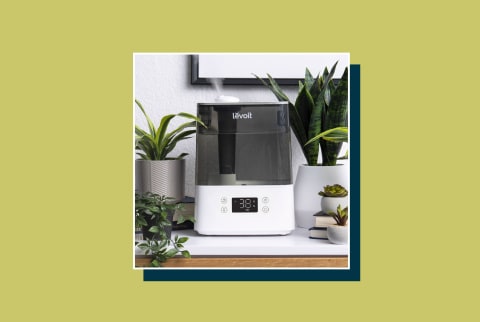
January 20, 2023
Our editors have independently chosen the products listed on this page. If you purchase something mentioned in this article, we may
Whether you have a common cold or seasonal allergies, sinus issues can interfere with your whole day—not to mention your night’s sleep. If congestion, a running nose, or a sore throat have sent you searching for solutions, you may have stumbled upon claims that a humidifier can help with sinus problems.
Humidifiers release moisture into the air, which can be beneficial for our skin, our houseplants, and—according to allergist Anjuli Mehrotra, M.D., even our sinuses. Read on to learn about the difference between humidifiers and vaporizers and how they can each benefit our sinuses. Plus, find our picks for the best humidifiers for sinus problems, with a few vaporizer options as well.
The best humidifiers for sinus problems:
Do humidifiers help with sinus problems?
Sinus problems can stem from a variety of root causes, such as the common cold, allergies, or sinusitis, which is when one or more of our sinus cavities becomes inflamed due to mucus buildup and blockages. According to Mehrotra, if you’re feeling stuffed up from a cold or sinusitis, a humidifier may help get your sinuses back on track.
“I do believe that humidifiers can be helpful for sinus symptoms that are unrelated to allergies (like sinusitis, colds, etc.), specifically for people who do not have coexisting allergies to dust mites or mold,” she says. “Humidifiers can provide some symptom relief by unblocking the nose and helping to loosen up mucus.”
However, Mehrotra notes that allergy-related sinus problems can actually worsen with the use of a humidifier, because humid air is a welcoming environment for allergens such as mold and dust mites. “Allergists typically recommend dehumidifiers for people suffering from dust mite or mold allergies as they can decrease the relative humidity,” she explains. “Generally, we recommend keeping humidity levels under 50% to reduce dust mite growth.”
What’s the difference between vaporizers and humidifiers?
While both vaporizers and humidifiers release moisture into the air, there are a few key differences between the two.
- Vaporizers boil water and release it into the air as steam. The steam will be hot, which can be beneficial for breaking up mucus. Just note, steam can burn your skin if not used carefully.
- Humidifiers use a diffuser to turn water into mist. They often have the option to warm or cool the mist before releasing it into the air—and they’re unlikely to burn your skin.
Mehrotra says an individual steam vaporizer might be more useful than a humidifier, due to the fact that it can more easily be directed towards sinus passages. “Individual steam vaporizers can be helpful for sinus issues—even for allergies—as they do not tend to increase the humidity within an entire room. The directed moisture is helpful with breaking up mucus and can make it feel easier to breathe.”
Just remember to keep it clean.
Whether you land on a vaporizer or a humidifier for your sinus problems, it’s imperative that you clean the machine regularly. A wet chamber left unattended can quickly become breeding ground for mold and mildew. Be sure to review our guide on how to clean your humidifier so you’ll be ready.
How we picked:
Because Mehrotra sees value in both vaporizers and humidifiers for relieving sinus problems, we included a few of each on our list. We also took her recommendation for warm air humidifiers, which she says can help encourage the release of mucus buildup.
We scoured reviews for each of these products and only included highly-rated picks that receive particularly high praise for their sinus-relieving benefits.
Everyone’s budget is different, so we made sure to include products that are available at a variety of price points (without compromising quality, of course).
These devices can get hot! That’s why we made sure all of the picks on our list have an auto-shutoff feature that stops the device when the water runs out.
Our picks for the best humidifiers for sinus problems:
Best personal vaporizer: Vicks VIH200 Personal Sinus Inhaler
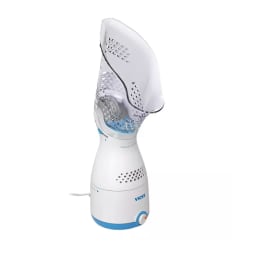
Pros:
- Great for quick relief from congestion
- Adjustable steam control
- Has a slot for Vicks scented pads
Cons:
- Mask can be awkward
- Needs to be used on a table or held upright
If you’re stuffed up, this personal vaporizer from Vicks is a quick and easy way to direct warm steam right to the source. To use this vaporizer, fill the bottom chamber with 2.5 tablespoons of tap water and place your face in the mask. Once you’ve gotten comfortable in an upright position, you can adjust the steam output to fit your comfort level and enjoy a 5- to 15-minute steam session. The brand also sells small pads that you can slide into the chamber to add soothing scents such as menthol or eucalyptus to the steam. The brand advises you not to add your own essential oils directly to the water chamber.
With over 13,000 ratings and 4.3 out of 5 stars on Amazon, this device gets great reviews for being easy-to-use and effective. One person writes, “I love this little steamer. It helps with my constant sinus issues and headaches. It does take a bit to start steaming, but once it starts it’s awesome.” Some folks mention the mask can be kind of rigid and awkward, and others say that this inhaler does need to sit on a table or be held upright to avoid leaks, and is not designed to be used while reclined.
Best humidifier for travel: Pure Enrichment PureSpa XL 3-in-1
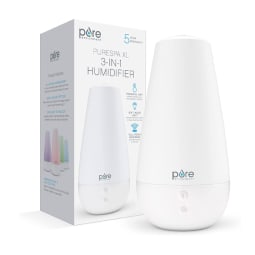
Pros:
- Small footprint for travel or desktop use
- Budget-friendly price
Cons:
- Cleaning may be tricky
- Not very customizable
This small-but-mighty humidifier is a great option for stowing away in your suitcase or for use in smaller spaces. In fact, we included this pick in our roundup of the best personal desktop humidifiers. The multipurpose device is a humidifier, essential oil diffuser, and mood light all in one compact machine.
Despite having a few bells and whistles, it’s fairly straightforward. There are two buttons that let you toggle through colors and choose between two mist speeds (low and high). The brand says this machine can run for 20 hours on high and 50 hours on low, although reviews are mixed on how often it needs to be refilled with water.
Reviewers generally love this humidifier, with over 4,000 ratings and 4.3 out of five stars to show it. People appreciate its straightforward design, although some say they wish the settings were more customizable and that it is a bit tricky to clean. Still, most reviewers comment on the ease of traveling with this little humidifier and many mention the positive impact it has on their sinuses. One says, “Easy way to keep sinuses happy! This is perfect for me to take on my travels to keep the hotel room comfortable and fresh.”
Advertisement
This ad is displayed using third party content and we do not control its accessibility features.
Best vaporizer for travel: MyPurMist Free Ultrapure Steam Inhaler
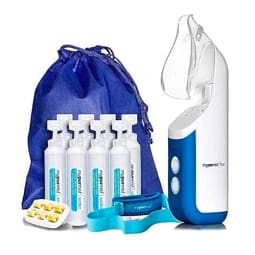
Pros:
- Cord-free design
- HEPA filter and sterile water pods
- No water chamber to clean
Cons:
- Cannot be used without the brand’s water pods
When you’re on the go, a cord-free device can be a big help—especially if you’re traveling internationally. While this battery-operated vaporizer is a more expensive option, it has a few standout features: a hands-free strap, a HEPA filter to trap allergens, a temperature control button, and the brand’s own sterile water pods.
The water-pod design means there’s no water chamber to continuously clean out, and you won’t have to worry about pollutants finding their way into your vapor. On the con side, you can’t use this device without the pods, so you’ll be re-purchasing them for as long as you plan to use the device.
The brand has been producing sinus-relieving staples for vocalists for years. It gets generally great reviews on sites like Amazon and Target, especially from folks with sinus issues. One person writes, “Great unit and you can travel with it easily. A must for people with sinus and nasal congestion—I recommend this highly.” Some negative reviews mention leaks or issues with the mechanics of their device, but most say the brand’s customer service was able to help with replacements and repairs.
Best overall humidifier: Levoit Classic 300S Ultrasonic Smart Humidifier
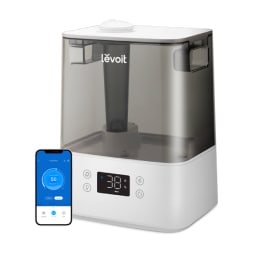
Pros:
- Sensor monitors your indoor humidity levels
- Can be controlled with a companion app or touchscreen
- Compatible with Google Assistant & Alexa
Cons:
- Some people say the app is not great
- A few small crevices are tough to clean
Additional features include a “Sleep Mode,” which dims the display lights and turns the mist level to low, an aromatherapy chamber for adding essential oils, and a top-fill design that makes filling this humidifier a breeze. While cleaning the tank is simple and straightforward, there are a few smaller crevices that can be a bit more difficult to clean.
With just under 20,000 ratings and 4.5 out of 5 stars, Amazon shoppers love this humidifier. One writes, “Got this since my daughter suffers from the dry winter heated air with a very sticky and stuffy nose. Replaced 3 top-rated bedroom humidifiers – all with just this one! I love that you can set it up on a timer so that her room is already humid before she gets to her bedroom & that if the temps change overnight, we can hold humidity at the right percentage.” Some note that they find the app unnecessary—if the app feature isn’t enticing for you, you might be satisfied with the more analog version of this humidifier, which will save you $10 and does not have app-pairing capabilities.
Advertisement
This ad is displayed using third party content and we do not control its accessibility features.
Best budget-friendly humidifier: Pure Enrichment MistAire Ultrasonic Cool Mist Humidifier (Large)
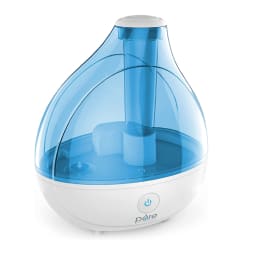
Pros:
- Straightforward design
- Covers up to 250 square feet
- Runs for up to 25 hours
Cons:
- No warm mist option
- Reviews are mixed about how easy it is to clean
Another pick from Pure Enrichment, this easy-to-use humidifier comes in three sizes. The large MistAire is the mid-sized option, which the brand says is suitable for up to 250 square feet. It doesn’t have many bells and whistles, with only two mist settings (high or low), but it gets great ratings for pumping out a lot of mist for up to 25 hours. For a slightly higher investment, you can upgrade to the MistAire XL, which is meant to cover 500 square feet and has a knob to further customize your mist output.
With over 100,000 ratings on Amazon and 4.4 out of five stars, people mostly love this humidifier. It gets high praise for being super quiet and easy to use, though there’s mixed feedback about how easy (or not) it is to clean. Be sure to read the instructions carefully for more detail on the cleaning process. Not sure how often to clean your humidifier? We’ve got you covered.
Best humidifier for easy cleaning: Miro NR08M
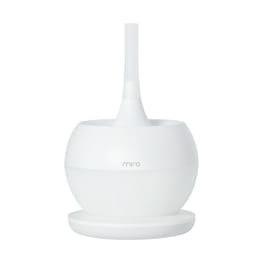
Pros:
- Easy to clean
- Sleek design with optional color-changing lights
Cons:
- Smart features requires additional purchase
There’s no such thing as a zero-maintenance humidifier, but this sleek, modular device makes keeping it a lot easier. The machine comes apart in seconds, so you can hand wash every surface that touches water,without having to finagle your way into tiny crevices. After you’ve cleaned each part, it snaps easily back together using magnets.
This humidifier also has a top-fill design that allows you to continuously fill the one-gallon water compartment while the device is still in use. The bottom has a touch panel to control the light color, mist speed, and timer.
Most users comment on how quiet this humidifier is and how easy it is to clean. One writes, “All surfaces are smooth and accessible, with no hiding places for the pink and black molds that always infest our other gadgets despite frequent (fussy) cleaning. Disassembly and reassembly to clean it takes a few minutes.” Some negative feedback mentions the power light being bright, and some folks complain that the Bluetooth connectivity chip requires an additional purchase.
Advertisement
This ad is displayed using third party content and we do not control its accessibility features.
How to choose a humidifier for sinus problems:
Consider the cause of your sinus problems
If allergies are the cause of your sinus problems, a vaporizer may be a smarter pick than a humidifier. While humidifiers can relieve sinus-related symptoms of allergies, they can also encourage the growth of mold and dust mites in your home, which could exacerbate your allergies.
Warm vs. cool mist
One 2017 study involving patients under mechanical ventilation found that warm, moist air was beneficial for loosening mucus1. However, if you’re not directly inhaling the air from the device (such as with a vaporizer), the temperature of the particles might not make a huge difference in how you experience the benefits.
Safety first
Every product on our list has an auto-shutoff feature, which should be non-negotiable when shopping for home devices like this. And, if you have children and pets in your space, it’s worthwhile to consider a table-top friendly humidifier that you know will be safely out of their reach.
Cleaning-friendliness
Again, your humidifier needs to be cleaned regularly. Some products on our list get higher praise than others for easy cleaning, so if you’re someone who groans over washing dishes, you’ll want to pick a product that’s as low maintenance as possible.
FAQ:
Is dry air or humid air better for sinuses?
According to Mehrotra, air that has humidity levels between 30 to 50% is most beneficial for sinuses. Extremely low humidity levels can cause dryness and irritation, while too much humidity can cause congestion and flare-ups of indoor allergies to dust mites or mold. Finding a humidifier that measures the humidity in your space can help you determine the best settings for you.
What is better for sinuses, a vaporizer or humidifier?
As Mehrotra explained, an individual vaporizer can help send warm steam into your sinus passages, which can help you feel faster relief from congestion. A humidifier may also be a helpful way to combat sinus issues due to dry conditions in your home—just try to avoid exceeding 50% humidity in your space, especially if you have a dust mite or mold allergy.
Can a humidifier make nasal congestion worse?
“A humidifier may make nasal congestion worse if the symptoms are due to allergies,” says Mehrotra. “Humidifiers increase the humidity within a room, which can cause dust mites to multiply, and homes with humidifiers also have a higher risk of mold growth. Humidifiers themselves can also breed unhealthy mold spores if not properly sanitized and spread them through their mist.”
The takeaway.
Whether you choose to add a humidifier to your home or opt for a personal vaporizer, a dose of moisture could give the relief your sinuses are craving. If you’re not quite ready to invest in one of the machines on our list, there are also plenty of expert-backed methods for increasing the humidity in your home without a humidifier. If you give your sinuses the TLC they deserve, you might just end up thriving through the cold and flu season!
